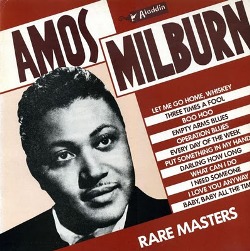Amos Milburn – Rare Masters 1946-1956 (1986)
Amos Milburn – Rare Masters 1946-1956 (1986)

Side A: 1. Let Me Go Home, Whiskey 2. Three Times A Fool 3. Boo Hoo 4. Empty Arms Blues 5. Operation Blues 6. Every Day Of The Week play Side B: 1. Put Something In My Hand 2. Darling How Long 3. What Can I Do play 4. I Need Someone 5. I Love You Anyway 6. Baby, Baby All The Time Musicians: Amos Milburn – piano Alladin Checken Shakers: Don Wilkerson – temor sax Clifford Smith - tenor sax Wiilie Simpson Jr. – baritone sax Johnny Brown – guitar Harper Cosby – bass Calvin Vaughn - drums
Boogie piano master Amos Milburn was born in Houston, and he died there a short 52 years later. In between, he pounded out some of the most hellacious boogies of the postwar era, usually recording in Los Angeles for Aladdin Records and specializing in good-natured upbeat romps about booze and its effects (both positive and negative) that proved massive hits during the immediate pre-rock era.
The self-taught 88s ace made a name for himself as "the He-Man Martha Raye" around Houston before joining the Navy and seeing overseas battle action in World War II. When he came out of the service, Milburn played in various Lone Star niteries before meeting the woman whose efforts would catapult him to stardom.
Persistent manager Lola Anne Cullum reportedly barged into Aladdin boss Eddie Mesner's hospital room, toting a portable disc machine with Milburn's demo all cued up. The gambit worked -- Milburn signed with Aladdin in 1946. His first date included a thundering "Down the Road Apiece" that presaged the imminent rise of rock & roll. But Milburn was capable of subtler charms too, crooning mellow blues ballads in a Charles Brown-influenced style (the two would later become close friends, playing together frequently).
The first of Milburn's 19 Top Ten R&B smashes came in 1948 with his party classic "Chicken Shack Boogie," which paced the charts and anointed his band with a worthy name (the Aladdin Chickenshackers, natch). A velvet-smooth "Bewildered" displayed the cool after-hours side of Milburn's persona as it streaked up the charts later that year, but it was rollicking horn-driven material such as "Roomin' House Boogie" and "Sax Shack Boogie" that Milburn was renowned for. Milburn's rumbling 88s influenced a variety of famous artists, notably Fats Domino.
With the ascent of "Bad, Bad Whiskey" to the peak of the charts in 1950, Milburn embarked on a string of similarly boozy smashes: "Thinking and Drinking," "Let Me Go Home Whiskey," "One Scotch, One Bourbon, One Beer" (an inebriating round John Lee Hooker apparently enjoyed!), and "Good Good Whiskey" (his last hit in 1954). Alcoholism later brought the pianist down hard, giving these numbers a grimly ironic twist in retrospect. Milburn's national profile rated a series of appearances on the Willie Bryant-hosted mid-'50s TV program Showtime at the Apollo (where he gave out with a blistering "Down the Road Apiece").
Aladdin stuck with Milburn long after the hits ceased, dispatching him to New Orleans in 1956 to record with the vaunted studio crew at Cosimo's. There he recut "Chicken Shack Boogie" in a manner so torrid that it's impossible to believe it didn't hit (tenor saxist Lee Allen and drummer Charles "Hungry" Williams blast with atomic power as Milburn happily grunts along with his pounding boogie piano solo). In 1957, he left Aladdin for good.
Milburn contributed a fine offering to the R&B Yuletide canon in 1960 with his swinging "Christmas (Comes but Once a Year)" for King. Berry Gordy gave him a comeback forum in 1962, issuing an album on Motown predominated by remakes of his old hits that doesn't deserve its extreme rarity today (even Little Stevie Wonder pitched in on harp for the sessions).
Nothing could jump start the pianist's fading career by then, though. His health deteriorated to the point where a string of strokes limited his mobility and his left leg was eventually amputated. Not too long after, one of the greatest pioneers in the history of R&B was dead. ---Bill Dahl, allmusic.com
download: uploaded anonfiles mega 4shared mixturecloud yandex mediafire download
Zmieniony (Sobota, 31 Sierpień 2013 10:57)








